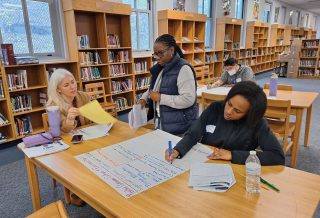FOCUS
Connections bring us closer to equity and justice
By Ellie Drago-Severson, Jessica Blum-DeStefano and Deborah Brooks-Lawrence
Categories: Change management, Facilitation, Learning communities, Personalization, Reaching all studentsOctober 2020
Vol. 41, No. 5
Read the remaining content with membership access. Join or log in below to continue.
Sed ut perspiciatis unde omnis iste natus error sit voluptatem accusantium doloremque laudantium, totam rem aperiam, eaque ipsa quae ab illo inventore veritatis et quasi architecto beatae vitae dicta sunt explicabo. Nemo enim ipsam voluptatem quia voluptas sit aspernatur aut odit aut fugit, sed quia consequuntur magni dolores eos qui ratione voluptatem sequi nesciunt. Neque porro quisquam est, qui dolorem ipsum quia dolor sit amet, consectetur, adipisci velit, sed quia non numquam eius modi tempora incidunt ut labore et dolore magnam aliquam quaerat voluptatem.
Questions to consider
To begin putting the strategies for developmental teaming into practice, consider the following questions, either individually or with colleagues:
What is one thing you value about your team?
What is one thing you’d like your team to get better at?
How has the shift to virtual team meetings been going for you?
What is one insight or takeaway from the ideas and strategies presented here?
What’s your next step?
References
Cross, W.E., Jr. (1995). The psychology of Nigrescence: Revising the Cross model. In J. G. Ponterott, J.M. Casas, L.A. Suzuki, & C.M. Alexander (Eds.), Handbook of multicultural counseling (pp. 93-122). Sage.
Drago-Severson, E. (2004). Helping teachers learn: Principal leadership for adult growth and development.Corwin/Sage.
Drago-Severson, E. (2009). Leading adult learning: Supporting adult development in our schools. Corwin/Sage Publications and Learning Forward.
Drago-Severson, E. (2012). Helping educators grow: Strategies and practices for leadership development. Harvard Education Press.
Drago-Severson, E. & Blum-DeStefano, J. (2016). Tell me so I can hear you: A developmental approach to feedback for educators. Harvard Education Press.
Drago-Severson, E. & Blum-DeStefano, J. (2017). The self in social justice: A developmental lens on race, identity, and transformation. Harvard Educational Review, 87(4), 457-481.
Drago-Severson, E. & Blum-DeStefano, J. (2018). Leading change together: Developing educator capacity in schools and systems. ASCD.
Drago-Severson, E., Joswick-O’Connor, C., & Blum-DeStefano, J. (2018). When teams hit rough waters: Navigate challenges with a developmental approach. The Learning Professional, 39(4), 54-58.
Helms, J.E. (1994). The conceptualization of ethnic identity and other “racial” constructs. In E.J. Thicket, R.J. Watts, & D. Birman (Eds.), Human diversity: Perspectives on people in context. Jossey-Bass.
Helms, J. (2020). A race is a nice thing to have: A guide to being a white person or understanding the white persons in your life (3rd ed.). Cognella.
Kegan, R. (1982). The evolving self: Problem and process in human development. Harvard University Press.
Kegan, R. (1994). In over our heads: The mental demands of modern life. Harvard University Press.
Singh, A.A. (2019). The racial healing handbook: Practical activities to help you challenge privilege, confront systemic racism & engage in collective healing. Harbinger.
Singleton, G. (2014). Courageous conversations about race: A field guide for achieving equity in schools (2nd ed.). Corwin.
Tatum, B. (2017). Why are all the Black kids sitting together in the cafeteria? And other conversations about race (20th anniversary ed.). Basic Books.
Categories: Change management, Facilitation, Learning communities, Personalization, Reaching all students
Recent Issues
LEARNING DESIGNS
February 2025
How we learn influences what we learn. This issue shares essential...
BUILDING BRIDGES
December 2024
Students benefit when educators bridge the continuum of professional...
CURRICULUM-BASED PROFESSIONAL LEARNING
October 2024
High-quality curriculum requires skilled educators to put it into...
LEARNING TO PIVOT
August 2024
Sometimes new information and situations call for major change. This issue...












